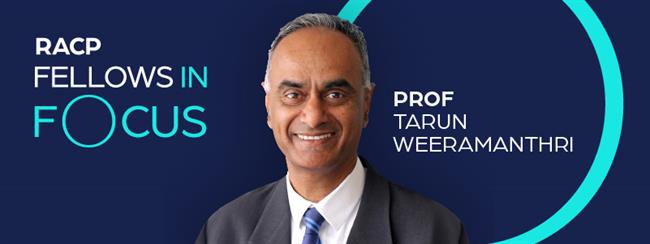RACP Fellows in Focus: Prof Tarun Weeramanthri
Date published:
15 Feb 2022

Professor Tarun Weeramanthri is President of the Public Health Association of Australia (PHAA) and an adjunct professor in the School of Population and Global Health at the University of Western Australia.
A trained specialist in internal medicine and public health, and has a PhD in social medicine and when asked why he chose to become a specialist he quipped,
“Because I am a generalist at heart. I picked two specialties that are in essence generalist specialties. It was originally called ‘general medicine’ and the other was ‘public health medicine’ and they both required you to get across a whole range of different areas. I've effectively picked two generalist specialist disciplines. You do require technical knowledge, but you also have to be able to connect things across different fields.”
“I chose general medicine because I found it the most interesting of all of the disciplines I studied in and worked in. It requires you to really understand the patient in a holistic way. I thought it was extremely challenging, intellectually, and… fun! It’s about seeing the patient as a whole person and then coming up with a clinical management plan that suited that person, not necessarily a single disease.”
And connecting things across different fields is exactly what he’s done with an impressive array of achievements and accolades. He was Chief Health Officer in Western Australia (WA) from 2008 to 2018, and in the Northern Territory (NT) from 2004 to 2007. In 2014, he was awarded the Sidney Sax Medal by PHAA for his contribution to public health in Australia i.e. the highest award given by the Public Health Association of Australia. From 2019-2020, he conducted a statutory Inquiry into the Impacts of Climate Change on Health in WA. And, in the last two years, he has worked with governments across Australia, state and federal, on the COVID-19 response, including the National Contact Tracing Review, and Review of Hotel Quarantine Arrangements in WA.
A wide spectrum of experience needs an impressive set of skills and the ones that Tarun processes are no exception. He told us,
“You've got to be really good at engaging with people and taking a history. That's the first thing I was taught medicine, it’s 70 per cent on the history. Having detailed conversations, and finding out crucial key facts and then you supplementing that with a really good physical examination specialist tests. It's really challenging as a clinician to be good in all of those dimensions. The challenge never stops. No matter how technology becomes it will never replace good history taking and a good physical examination. General medicine is the prime example of that.”
Throughout his career, Tarun has not shied away from challenges and a particularly poignant challenge of working and living in rural parts of Australia,
“If you like to work with fewer resources than are available in a big metropolitan city, move out of your comfort zone to work in the country. Although Royal Darwin is a well functioning tertiary hospital, the Northern Territory as a whole has different health challenges with fewer resources.”
Through the constant need to be on top of his game and the fluctuating plethora of challenges coming his way, Tarun explained what the future held for him,
“[I want to] build on the momentum of climate change as a health issue and galvanise the health and public health sectors to take action on it. Not just reducing emissions, but also the adaptation challenges that there are in public health.”
“I'm immensely proud of the last 10 years. I think we re-established Western Australia, as a stronghold for good public health. The highlight of that was the new public health act that came in in 2016. The old health act was from 1911, so we brought in a
“once-in-a-century,” new public health act. That will be there for the next 50 years. But, it's always, what's the next? I'm very much at that point now in terms of what's the next challenge.”